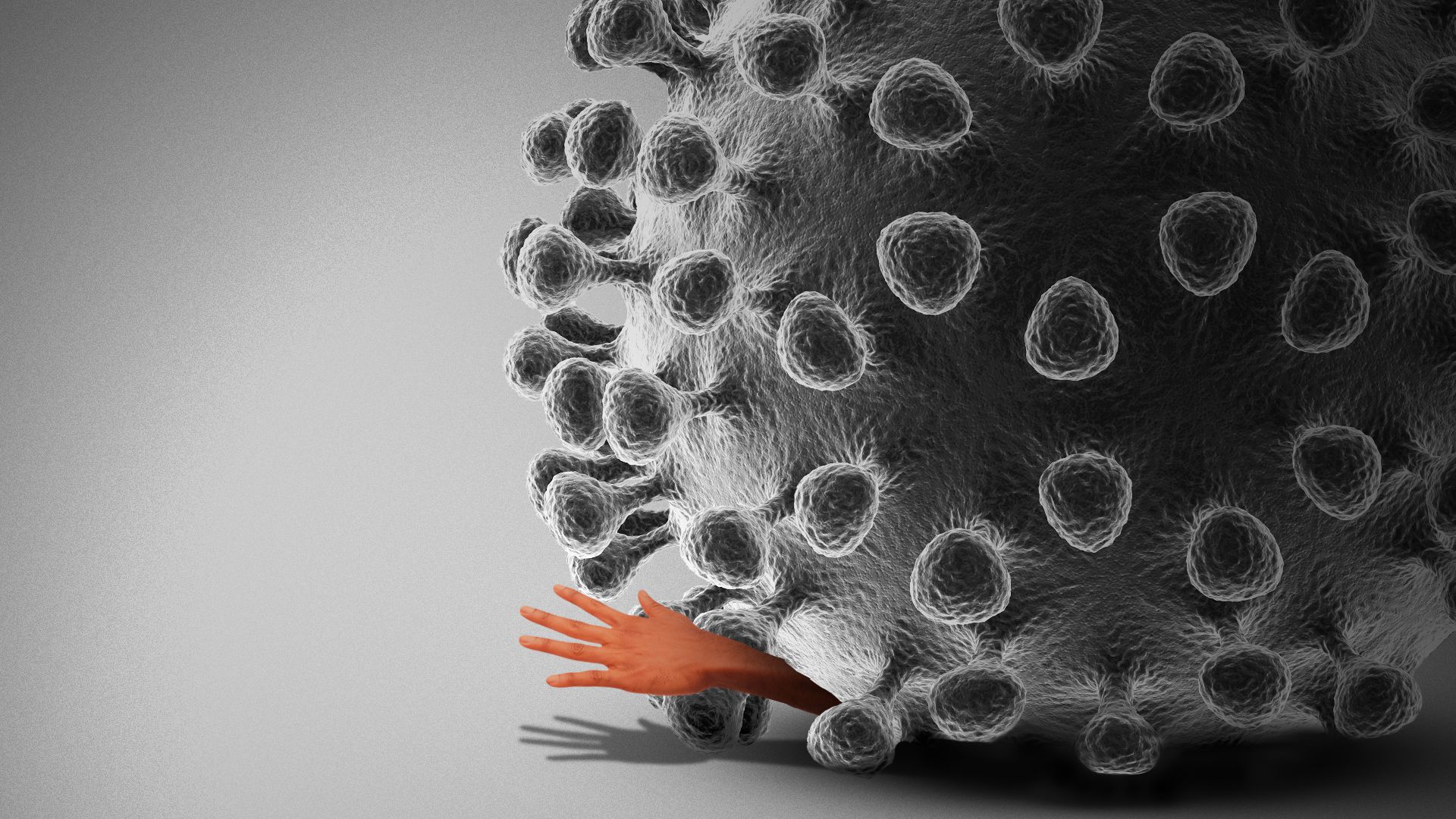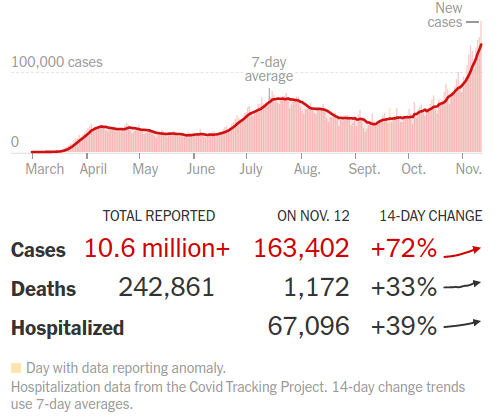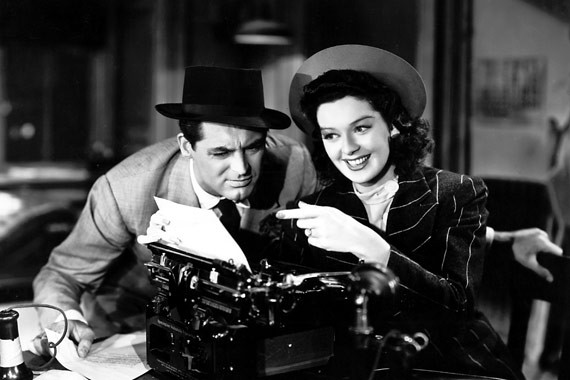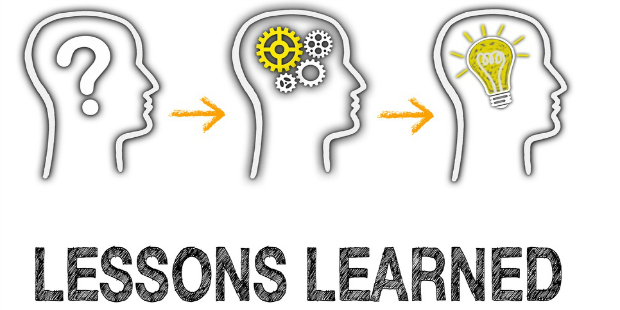14 November 2020 (Chania, Crete) – The last time it was Friday the 13th, it was March. On that Friday, the U.S. Centers for Disease Control and Prevention reported 1,678 coronavirus cases and 41 deaths. The U.S. collegiate football association canceled its tournament. And the White House issued a “proclamation on declaring a national emergency concerning the novel coronavirus disease.”
NOTE: most of the statistics I will quote will be from the U.S. and UK because those are my strongest COVID-19 information streams.
Eight months later and both the U.S. and the UK find themselves on the precipice of (and some argue in the middle of) the worst possible scenario: as I write this, in the U.S. there are 10.6 million cases and 243,000 deaths, and in the UK 1,317,496 cases and 51,304 deaths. In both the U.S. and the UK, “excess deaths” (higher than would be expected) from heart and circulatory diseases (just to name them) have reached new levels since the start of the coronavirus pandemic.
Each day in each of those countries we cross a new record-breaking threshold of COVID-19 cases, and at this point scientists have conflicting reasons (beyond the blatant disregard of other people) why this is happening. For a visual of the U.S. :
Source: Johns Hopkins Coronavirus Resource Center
We know masks work at reducing the spread of the virus, for example, but many people choose to not wear masks. We know that being indoors with people increases the risk of spreading the virus, and yet we gather. In the U.S., poor guidance at the Federal (i.e., none) level and at state levels … oh, a mess. Comically, for instance, New York and New Jersey believe that keeping schools [which haven’t proven to be superspreader environments] closed but restaurants and business open [which have; oh, except between 10pm and 5am, which apparently is when the youngun’s go out and spread the virus] is the right call). And with the holiday season approaching, it’s only going to get worse. Scan the UK media reports and you get the same thing.
I have access to a bevy of journalists who cover government *responses* across the U.S. and Europe. Two of them I work with (one in the U.S. and one in the UK) voice what all of them say:
We are just exhausted and infuriated to be doing the same interviews and hearing the same stories for a third time. Why haven’t they learned? What in hell have they been doing between March and November?
Ah, yes. The bullshit that is government. As I wrote earlier in my COVID series, the real bullshit part is caused by the leaking/pre-briefing/rogue-tweeting operating model of modern political governance. I can understand they want to pre-socialise a policy so that they can gauge voter impact, but it creates a grey/opaque policy because it desensitizes the population to the eventual policy. This grey area is where things can get twisted/faked and ultimately dangerous. To continue with the transparent image analogy – the alpha channel really needs to be black and white. In other words the lesson is that policy needs to be voiced once, clearly, through a trusted medium and followed quickly and completely with the appropriate detail; which is either fully transparent or private edict like, not half explained.
It is a major FAIL FAIL FAIL on all counts. As The Orange Mophead might put it “we screwed up bigly”.
BUT … we built it that way. After 40+ years of the conservative project to “shrink government to the size I can drown it in the bathtub”, state capacity across the U.S., UK and other Western nations is greatly diminished.
AND … it also revealed why Asian countries, in general, have fared much better. In the “Western World vs The Rest of the World” comparisons: their environment, care environment, relationship to families, living situation and style of living made it easier to handle the pandemic than the West.
And it’s not like the media hasn’t covered the coronavirus from all angles. In fact, talking with reporters across a bevy of newsrooms, there’s an interesting tension of being both fatigued and energized by covering this. On the one hand, writing about sickness and death and uncertainty is exhausting. It’s a punishing existence having to cover a disease that impacts every facet of our society, from the personal to the professional.
On the other hand, knowing that (a) this is arguably the most important story of the moment (honorable mentions go to climate change and the collapse of the American empire), and (b) their reporting can save lives, reporters put their heads down and carry on. I have a lot of issues with journalism but I believe most journalists want the closest thing to truth. And that a large percentage of Americans have bought into Trump’s shameful “media is the enemy” rhetoric is appalling. The effects of this have eroded trust in the media, but also, apparently in U.S. elections. For instance, 8 in 10 Republicans believe Joe Biden’s win is not legitimate. And, as I have written, this lack of trust of media and other institutions coincides with the spread of disinformation on platforms like YouTube, Twitter and Facebook.
In the U.S., a lack of trust in media, a general skepticism in science, the spread of misinformation that pushes fears, desperations and anxieties, all coalesce into behaviors and actions that play out in an individualistic manner. So for many, many Americans they don’t look to do things for the greater good, but to make sure that their individual “freedoms” aren’t infringed upon. They don’t wear masks, they gather indoors – they ignored professionals in favor of grifters.
The fissures in society, sadly, are going to get worse before they get better.
What the pandemic has done is force a kind of transparency as to how societies actually function, how information flows through those societies, and how governance works in those societies. In effect, the pandemic seems to be revealing the overall personal and shared social values of individual societies. The question for Western democracies is what, if any, reckoning then follows. It seems quite clear that strong democracies led by qualified people like Germany, New Zealand, and Australia have done quite well. As to the UK, a journalist chap told me:
In the UK, the Tories will have quite capably engineered nearly 15 years of rule by the time of the next election. Presiding not only over one of the likely most disastrous economic decisions in the country’s history, but now an ongoing failure of one of the world’s ostensibly most capable healthcare systems to mitigate the death rate of a virus the country had months of warnings about.
Are we witnessing the rise of the perceptual democracy? Where people do not vote their fundamental interests, but rather the shape of their dendrites?
When I go in the street in London today, it is empty. There are lines outside shops. There are significant restrictions on personal freedom. Yet the virus still seems to be endlessly spreading, and the government seems in continual disarray. Does Britain still have a Western government?
I think this is just another manifestation of the fundamental perversion of idea of democracy, whether by punditry in the media as opposed to news (snap judgements), whether by fun and ease of consumption over the effort of debate and discussion (laziness), whether by remembering the sensational over the substance of an argument (anchoring) and lastly whether by people agree with us or not (confirmation bias).
Democracy is now an exercise in the worst aspects of behavioral psychology and we the voters are being played by the exercise of those deeply human flaws. Compounding all that, the unchallenged victory of the shareholder’s first dogma in corporations has driven us towards a society that puts money ahead of human life and individuals ahead of society at large. Politicians are merely mirrors to the society we have created over time. We do get the politicians we deserve and these are the long run costs of thousands of individual decisions made over 30-40 years.
We seem to have forgotten that democracy is a balance between individual rights granted to and guaranteed by the state and obligations that the state places upon the individual. Good functioning societies/states display that balance over time and not in a snapshot. Eastern states have a more collective culture where that is accepted while in the West we have chipped away at that and got away with it. That chipping away manifests itself in many ways, e.g. “small state” politics impairs the state’s ability to respond to complexity events because the political cost/benefit gamblers’ analysis always is “Will this happen before I leave office?”
I’m not sure how you change this because I keep thinking of the analogy of the frog in the slowly warming pot. We’ve got too comfortable and while we know there’s an existential threat it’s way too far away to step out into the cold and we’re too smart to get caught anyway.
And that is the mega-issue we’ve learned. At one time (throughout antiquity and the Middle Ages), humans understood themselves to be at home in a God-given nature-cosmos. They were a natural thing among other natural things, an entry among entries in the great chain of being. But over time humans began to differentiate themselves from nature. They increasingly looked at nature as the “out there,” as a place of origin to which they had once belonged but from which they had escaped. Nature now became the dominion of animals and plants, the dominion of the non-human. The human, capable of reason and thus of (artificial) technology or inventions that don’t exist in nature and that hence are a form of freedom. Nature, the non-human, other than technology or artifice, without reason, organized in terms of (physical) necessity and unhindered passion, a state in which humans cease being human and instead live the lives of animals.
Nope. I have come to think of COVID-19 as a great “un-differentiation” event. What I mean by this is that COVID-19 systematically undoes the differentiation of the human from nature that first occurred in the early modern period and that has been taken for granted ever since. The practice of modern politics entails defending the human against nature. The form this has taken thus far is a shelter-in-place policy. People are asked to stay at home: Do not go “outside.” Do not go “out there”.
This un-differentiation occurs across many different layers but let me focus on just two: if the zoonotic layer un-differentiated us from nature by showing that we are animals among animals, then the genetic layer un-differentiates us from nature by bringing us into view as a tentative chance product of cellular evolution in a viral world. Our 8% viral DNA makes clear that the history of our genome exceeds the history of the human species by hundreds of millions of years. And COVID-19 makes plain that this evolution is ongoing. We are all part of “the out there”.
Much more to say but I’ll leave it there. The next Friday the 13 will be in August. We will be 8 months into a Biden administration. A lot can happen, but as we’ve seen, many things can remain the same.



